In March 2001, the new Athens International Airport opened its doors for business, not as central as the old airport, it's about an hours drive from the city center depending on the infamous Athens traffic, but a vast improvement.
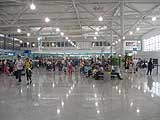 Getting from the airport to the city center couldn't be easier and the
airport information desk will help; you're faced with a couple of choices:
Getting from the airport to the city center couldn't be easier and the
airport information desk will help; you're faced with a couple of choices:
Buses, 3 choices, depending on your destination;
E94 connects you with the nearest metro station at Ethniki Amina. This service is only suitable for daytime arrivals as the Metro stops running at midnight.
E95 Airport Express, connects Syntagma Square with the airport via Vas. Sofias Avenue, Mesogion Avenue and Attiki Odos.
E96 Airport Express, connects the port of Piraeus with the airport via Posidonos Avenue, Varis-Varkizas, and Varis-Koropiou.
Both the E95 and E96 run generally every 20 minutes during the day and every 40 minutes after midnight.
By Metro, line 3 (the "Blue Line") will take you to Syntagma Square and Monastiraki. From Monastriaki you can change trains to get to Piraeus. The cost of a ticket from the airport is 8,00 per person. [ ATHENS METRO MAP]
The easiest method is by Taxi, either by joining the queue at the airport Taxi rank or by prearranging for a dedicated taxi to be waiting for your arrival, at whatever time that might be. The cost should be about € 30 to the city centre, slightly more if you donit like queuing.
If you are planning to fly to Athens and then fly to an island then it's best to do it the same day if possible and don't go into Athens until the end of your trip. The best idea would be to fly to Athens, spend a day or two there and then take the ferry or flying dolphin to get to your island since this gives your itinerary a bit of flexibility to take into consideration delays and connection schedules.
If you are trying to decide whether to fly or take a ferry to the islands this may help you.
If you are going to Mykonos for example it is a 30-minute flight. But it may take you an hour and a half to get to the airport if traffic is bad, plus you need to be there an hour before your flight to check in. Then provided there are no delays when you land in Mykonos you have to get into town or wherever your hotel is, which will take another 30 minutes including getting your bags. Total time: Three and a half hours.
If you take a high speed ferry or a Catamaran it will take you 15 minutes to get by taxi or metro to the port and in less then two hours you are on Mykonos and right in town. Total time: About two hours and fifteen minutes. Even the slowest ferry will take you less then 5 hours and will be a lot more relaxing and interesting than what you will have to go through to fly there.
Santorini is a longer trip but even so the pros of ferry travel outweigh the cons of flying.
If you are making a connecting flight to the island on the day you arrive from Greece then this is a different story though make sure you have plenty of time between flights in case you are delayed. But if you are planning to spend the first day or so in Athens our advice is to take ferries.
If you take a taxi in Athens it's
best to follow these simple guidelines (cabbies have been known to
take advantage of unsuspecting tourists and overcharge them):
Make sure that the cab driver turns his "Meter" on from the moment
you begin your ride.
- Do not make "a deal" with the taxi driver. The cab fare is never negotiable and any agreement you might make with him is going to be to your disadvantage.
- Look at the meter and make sure that it is running at the normal speed. You can determine this by looking for the number " 1 " or the number " 2 " in one of the 4 corners of the meter's face. If you see the number 1 then it is correct. If you see the number 2 then it is running at double the normal rate.
- The double rate is only applied when you use a cab after 12 midnight or if you take the cab for a trip far outside the Athens city limits which does not apply to the new airport.
- There is a small additional charge (about € 1) for every suitcase you load into the cab's trunk, which is added to the total indicated by the meter.
You can tip the driver (but only if you want to) at a rate of 5 - 10% at your own discretion.
It took 2000 years but Athens finally has a metro, even if there is nowhere you need
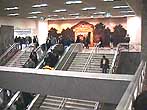 to go with the new metro, it is worth visiting it and even taking a
ride a few stops. As you may have heard, work on the metro was
slow because of all the antiquities they discovered. Every time
they dug a new hole they would find a grave, or a wall or an urn
and everyone would have to put down their picks and shovels and
call in the archaeologists who would do their digging with
tweezers and toothbrushes, which is a little bit slower. So the
main problem was not having to dig through rock, but having to sift through history.
to go with the new metro, it is worth visiting it and even taking a
ride a few stops. As you may have heard, work on the metro was
slow because of all the antiquities they discovered. Every time
they dug a new hole they would find a grave, or a wall or an urn
and everyone would have to put down their picks and shovels and
call in the archaeologists who would do their digging with
tweezers and toothbrushes, which is a little bit slower. So the
main problem was not having to dig through rock, but having to sift through history.
The time spent was worth it because Syntagma is more than a metro station, it's a museum. Syntagma Square station is the crowning achievement in the marriage between high-tech transport and archaeology. In the entrance are photos of Athens from 100 years ago when it really was one of the most beautiful cities in Europe.
You walk down some marble steps and find yourself in a modern universe. The tickets
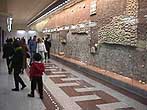 are sold on your right or by machines that for now only take coins,
the escalators take you down to the lower lobby and the trains.
But don't go down right away. There is much to see. To the right,
on the balcony that surrounds the lower lobby encased in glass is
the stratified excavation where you can see artifacts from
different periods of Athenian civilization from Byzantine through
Roman to classical Greek, and pre-historic. There is a grave,
cisterns, portion of a wall, an ancient road, clay drainage pipes and more.
are sold on your right or by machines that for now only take coins,
the escalators take you down to the lower lobby and the trains.
But don't go down right away. There is much to see. To the right,
on the balcony that surrounds the lower lobby encased in glass is
the stratified excavation where you can see artifacts from
different periods of Athenian civilization from Byzantine through
Roman to classical Greek, and pre-historic. There is a grave,
cisterns, portion of a wall, an ancient road, clay drainage pipes and more.
Around the corner in glass display cases are ancient pots, columns and many of the artifacts that were found while digging the station. The lobby is a museum and while many people make their way through the station with the determination of seasoned commuters, many people wander around examining the exhibits.
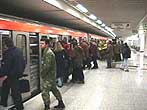 The trains themselves are not the super-high-tech streamlined ones; in
fact they look like ordinary old trains, only newer, cleaner,
smoother and faster. They are fully automated and a woman's voice
tells you which stop is coming next and to get out of the way if
you don't want to hurtle through the tunnels of Athens with half
of you hanging out the subway door.
The trains themselves are not the super-high-tech streamlined ones; in
fact they look like ordinary old trains, only newer, cleaner,
smoother and faster. They are fully automated and a woman's voice
tells you which stop is coming next and to get out of the way if
you don't want to hurtle through the tunnels of Athens with half
of you hanging out the subway door.
One thing to remember is that the metro stops running at midnight, which might be a little early if you are out enjoying the Athens nightlife, so be sure to read our Taxi Tips.
May-June and September-October are great months. The weather is perfect and the kids are in school so it's quieter. There is still some nightlife but the beaches are almost free of people on the less mainstream islands. You may get a day or two of rain but it usually adds a little excitement. If you go early in the spring or late in the summer then bring a windbreaker and a warm sweater. You probably won't need more then that.
July and August are fine if you are prepared. It's more crowded and rooms are harder to find, but the island nightlife is jumping and the beaches are lively. Athens can be brutally hot in the day but mornings and late afternoons are fine and the nights in the Plaka are wonderful if not a little crowded.
November to March can be cold and rainy but it can also be like Indian Summer. Athens comes alive during these months and there is nothing like a night out in the city. It does snow in Greece. Not more then once a season in Athens or the islands, in fact rare enough for it to be a major event. However it does snow in the mountains so much so that you can ski there.
April is usually Easter time, which is magical. If you are lucky enough to be on an island during Easter when all the wildflowers are in bloom and the smell of lamb roasting fills the air, you're sure to have a special time.
The 15th of August is the biggest holiday in Greece along with Easter. The days preceding and following these holidays are the worst times to be traveling. If you are on an island there will be a lot happening so keep your eyes and ears open. It is also the best time to be in Athens because the city will be empty. It will also be hot. In August in Athens go for the hotel with AC.
The Greeks love to eat. (Who doesn't?) Many people have a fear of coming to Greece
 because they are afraid of the food. There's nothing to be afraid of. It's
not like Mexican or Indian, nothing is so spicy you can't eat it
and the seasonings they use are the very same ones you have on the
spice shelf in your kitchen. And unlike the crappy oil that
terrorizes the hearts of the health conscious, Olive oil is good
for you and will keep you alive long after many of your friends
have taken the next step in their spiritual evolution.
because they are afraid of the food. There's nothing to be afraid of. It's
not like Mexican or Indian, nothing is so spicy you can't eat it
and the seasonings they use are the very same ones you have on the
spice shelf in your kitchen. And unlike the crappy oil that
terrorizes the hearts of the health conscious, Olive oil is good
for you and will keep you alive long after many of your friends
have taken the next step in their spiritual evolution.
What usually happens when you walk into a restaurant is after finding a table (almost always outdoors between the months of May and October), you will be permitted or encouraged to go to the kitchen to see what they have to offer. There will be a large steam table full of pots with different dishes in them. Pick out what looks good and don't be afraid to ask your cook, waiter or host "Tea eeneh aftoe?". You have just asked "What is this?" Try to remember what it's called until you get back to the table or just tell the guy right there "Thelo aftoe." It will magically appear on your table.
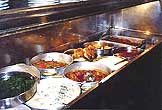 They will also show you their assortment of meats and fishes for
grilling. It's usually all pretty fresh. Some of the fish may have
been frozen and the squid generally comes from the Atlantic or
Monterey California in the summer months.
They will also show you their assortment of meats and fishes for
grilling. It's usually all pretty fresh. Some of the fish may have
been frozen and the squid generally comes from the Atlantic or
Monterey California in the summer months.
If you see fried squid on a tray don't order it. You don't want anything fried unless it is cooked to order, which is generally the case. If you are beginning to feel intimidated, just remember that 90% of the people in restaurants speak English.
